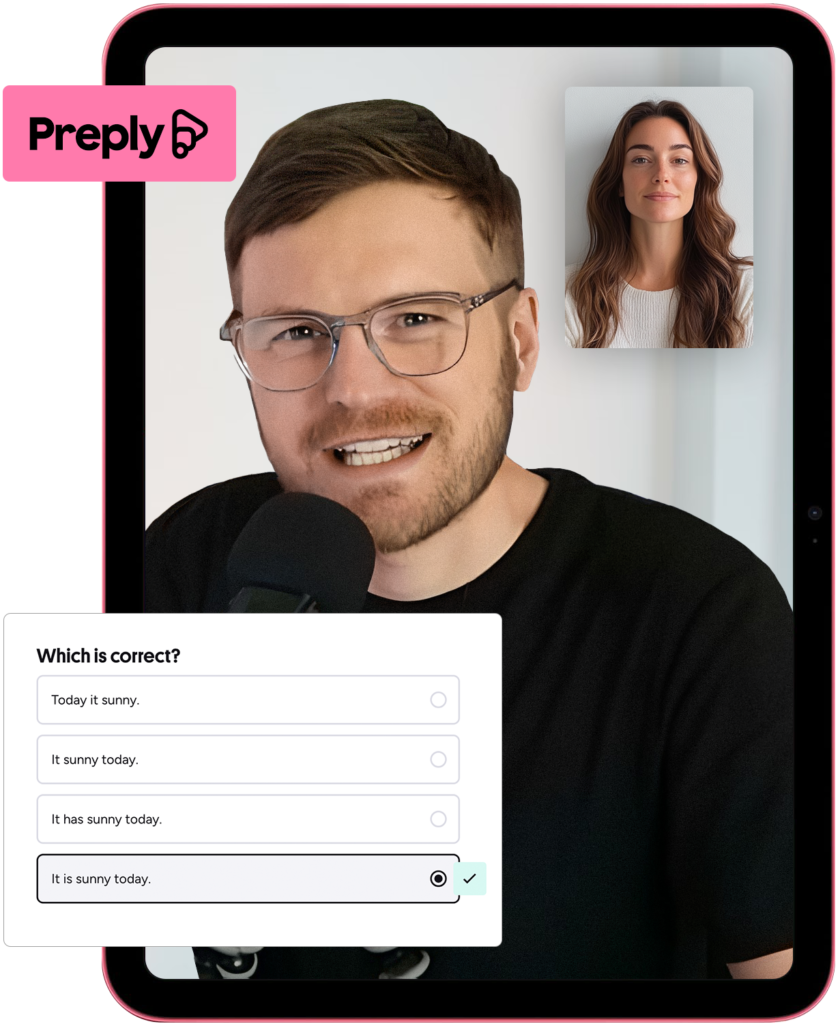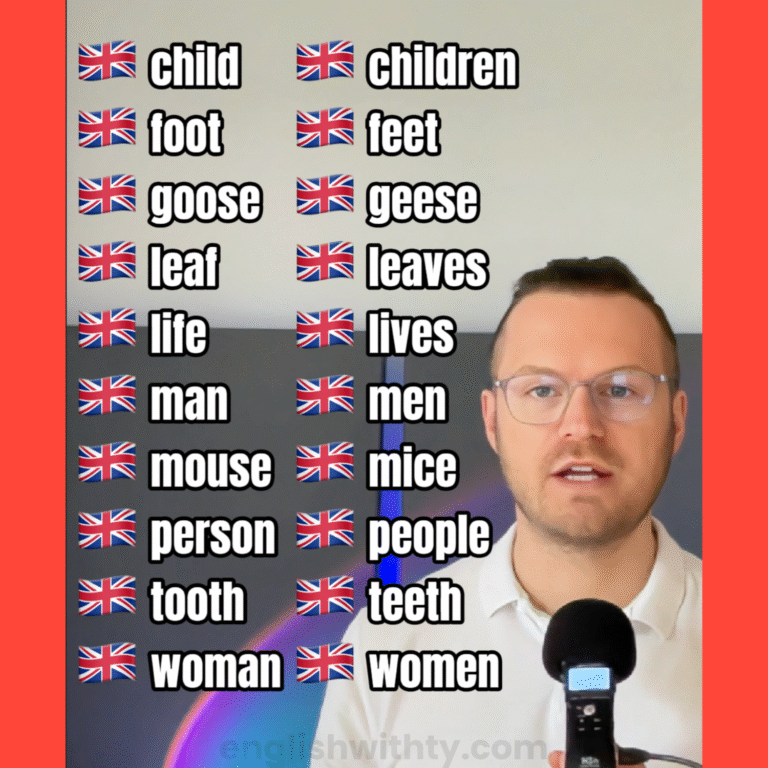If you want to learn English tenses, signal words are your best friends for recognising them instantly. They easily show you which tense is used in a sentence without having to memorise complicated grammar rules. That’s why, with the help of signal words, you can not only identify English tenses but often even understand the entire context of a sentence.
In this guide, I will explain what signal words are and how you can use them to take your English to the next level. Let’s get started!
Here are the most important points:
- If you can recognise English signal words, you will become much more confident in using English tenses.
- Signal words indicate whether a sentence refers to the past, present, or future.
- There is a total of 12 tenses in English – each tense has its own signal words.
- Examples of English signal words include “always” (Simple Present), “last year” (Simple Past), and “tomorrow” (Will-Future).
- Signal words, along with regular practice, are key to learning English tenses and using them correctly in everyday life.
How do signal words work, and why are they so useful?
Simply put, signal words function like signposts, helping you quickly understand the meaning of an English sentence. Specifically, they give you clear clues as to whether an action took place in the past, is happening now, or will happen in the future.
For example: A word like “yesterday” almost always indicates the past tense, while “tomorrow” clearly signals that the sentence is referring to the future. Specifically, when the word “yesterday” appears, you can recognise that the sentence is in the Simple Past tense. “Tomorrow” is most commonly paired with the Will-Future.
Keep in mind: Signal words can signal multiple tenses!
For example, the word “tomorrow” and some other signal words can sometimes have multiple possibilities when it comes to the actual tense. From a German perspective (which is my native language), I would say that the word “tomorrow” clearly describes the future. From an English perspective, this is also the case, but this word can also be used with the Present Continuous form.
For example, if asked “What are you doing tomorrow?”, the assumption is that “tomorrow” obviously refers to the future. However, here it is discussed using the present continuous form, because the question uses the “Present Progressive” tense (aka Present Continuous). This can be identified by the “-ing” form of the verb “doing” and the use of the verb “to be” (are) after the subject. It’s important to understand that the “future” is intentionally being discussed with this tense here. In other words, a signal word can not only indicate one tense, but multiple tenses.
Nevertheless, the following is still a very important point: If you can confidently identify the signal words in English sentences, it will be much easier for you to recognise English tenses. To help you achieve this, you will learn what signal words actually are, how to recognise them, and how to use these “signposts” for your learning progress.
Improve your English right now by repeating the workout video with example sentences in all 12 English tenses. Then, complete Interactive Exercise 1 below the video to test your knowledge!
Advanced English Tenses Workout 🗣️🇬🇧 Repeat After Me ↓
What are signal words?
Signal words are specific words or phrases that show you which tense is used in a sentence. They function like key terms, making it easier for you to recognise and apply the correct tense.
For Example:
- Words like “often” or “always” are usually found in the Simple Present tense.
- Expressions like “last year” or “in 1990” often indicate the Simple Past tense.
So, if you want to recognise tenses in English, signal words are an essential tool for you to have.
Before you learn how to properly use signal words, let’s refresh your memory. This will help ensure you’re clear on the basics of English tenses. Additionally, the next two sections will cover how many English tenses there are and when to use each one.
If you already feel confident with these basics, you can simply skip to the section “How to remember English tenses? Practical tips.”
By the way: If you’re looking for helpful PDF guides on how to master the English language, you can download very detailed PDFs via this link. These contain overviews, rules, and plenty of exercises to take your English to the next level.
How many tenses does the English language have?
The English language has 12 main tenses, which are divided into past, present and future. Tenses are important in sentences because they form the basis for being able to confidently construct your own English sentences and convey information accurately. It should also be mentioned that the English language essentially has the same 6 main tenses as the German language (by the way, this entire blog post is also available in German here)
- Präsens (Present Simple),
- Präteritum (Past Simple),
- Perfekt (Present Perfect),
- Plusquamperfekt (Past Perfect),
- Futur I (Future Simple)
- Futur II (Future Perfect)
In the English language, each of these tenses also has a continuous (progressive) tense, which doesn’t really exist in the German language and many other languages. So if it’s not clear what is meant by the term “continuous tense,” you can read a detailed explanation on Wikipedia.
The 12 English Tenses:
- Present Tenses: Simple Present, Present Progressive.
- Past Tenses: Simple Past, Past Progressive.
- Future Tenses: Will-Future, Going-to-Future, Future Progressive.
- Perfect Tenses: Present Perfect, Present Perfect Progressive, Past Perfect, Past Perfect Progressive, Future Perfect, Future Perfect Progressive
Exercise 2: Watch the video and complete the exercise below ⬇️
Sign up to my Newsletter now to download the free PDF ⬇️
Table of Signal words with all English Tenses
When do you use which tense in English?
In order to use tenses correctly and confidently, you need to pay attention to clear rules. These rules tell you when to use which tense. To apply tenses correctly, a bit of memorisation and practice is necessary. For this reason, this article includes interactive exercises to help you better understand signal words and tenses (see below). There are a few basic principles you can remember to become more confident in this area quickly.
In any case, we will first divide the sentences into present, past, future, and perfect tenses and remember the following rules:
Present Tenses with Examples
- Simple Present: Use this tense for regular or general actions.
Example: She always drinks coffee in the morning. - Present Progressive: Use it for actions that are happening right now, are temporary, and/or have a continuous form.
Example: He is reading a book at the moment.
Past Tenses with Examples
- Simple Past: Describes completed events in the past.
Example: I visited London last year. - Past Progressive: Is used to describe an action that happened at a specific point in the past.
Example: They were watching TV when I arrived.
Future Tenses with Examples
- Will-Future: Expresses spontaneous (future) decisions or predictions. Also known as “Simple Future”.
Example: I will call you later. - Going-to-Future: Is used for planned actions in the future.
Example: We are going to travel to Spain next month. - Future Progressive: Describes actions that will be ongoing at a specific point in the future.
Example: She will be working on her project tomorrow at 3 PM.
Perfect Tenses with Examples
- Present Perfect: Is used to describe actions that started in the past and continue into the present or whose result is relevant. Example: She has already finished her project.
- Present Perfect Progressive: Expresses actions that started in the past and are still ongoing, with the focus being on the duration.
Example: I have been waiting for the bus for 30 minutes. - Past Perfect: Describes an action that was completed before another action in the past.
Example: He had left before I arrived. - Past Perfect Progressive: Is used to emphasise the duration of an action that took place before another action in the past.
Example: They had been studying for hours when the exam started. - Future Perfect: Expresses that an action will be completed at a specific point in the future.
Example: By next year, she will have completed her degree. - Future Perfect Progressive: Describes an action that will continue until a specific point in the future, with the emphasis on the duration.
Example: By 6 PM, I will have been working on this report for five hours.
To summarise: There are 12 different tenses in English that you need to remember. Present tenses are used to describe regular or general actions. Past tenses (Simple Past and Past Progressive) apply to events in the past. Future tenses are used to describe predictions or planned actions in the future.
PS: If you want to completely refresh your knowledge of the most important irregular verbs that are used with these tenses, I recommend my 1-hour video course below. I explain everything you need to know about irregular verbs and there are lots of examples with different tenses, as well as exercises to repeat after me.
Now, I will explain in detail how you can easily recognise all English tenses with signal words.
How to remember English tenses? Signal words are key!
Signal words appear in almost every English sentence. Exceptions are typically only found in very short sentences or statements where the time context is clear from the conversation or sentence structure. This means: If you understand signal words and can connect them with the correct English tenses, you will make a big step forward in your learning process.
Signal words are basically terms that provide information about the time context of a sentence. If you interpret these words correctly, you should be able to understand whether the statement refers to the present, past, or future. With a bit of practice, you’ll be able to recognise all 12 tenses based on the signal words.
Now, I’ll show you some examples of what you can use as signal words in the present – that is, for the present tense:
Examples of Signal Words for Present Tenses:
| Tense | Signal Words | Example (Beginner) | Example (Advanced) |
| Simple Present | always, usually, often, never, every day | She always drinks tea. | They often visit museums to expand their knowledge. |
| Present Progressive | now, at the moment, currently | I am reading a book now. | He is currently working on a challenging project. |
Remember:
- You use the Simple Present for regular or universal statements.
- You use the Present Progressive for actions that are happening right now or for actions that have a continuous aspect.
Now, let’s look at examples of signal words for past tenses:
Examples of Signal Words for Past Tenses:
| Tense | Signal Words | Example (Beginner) | Example (Advanced) |
| Simple Past | yesterday, last week, in 2010 | I went to the park yesterday. | She finished her thesis last year, earning high praise. |
| Past Progressive | while, as, at that moment | He was watching TV while I cooked. | As they were discussing the issue, a solution emerged. |
Remember:
- The Simple Past describes completed events in the past.
- The Past Progressive is used to emphasise actions that were ongoing for a longer period in the past.
You can recognise future tenses with these signal words as examples:
Examples of Signal Words for Future Tenses:
| Tense | Signal Words | Example (Beginner) | Example (Advanced) |
| Will-Future | tomorrow, next year, soon | I will call you tomorrow. | They will probably finalise the report next week. |
| Going-to-Future | in the near future, soon, shortly | We are going to visit Grandma. | The company is going to launch a new product line shortly. |
Remember:
- The Will-Future (Simple Future) expresses spontaneous decisions or predictions.
- The Going-to-Future describes planned actions or clear intentions for the future.
Now, let’s move on to the perfect tenses and the signal words you should look out for:
Examples of Signal Words for Perfect Tenses:
| Tense | Signal Words | Example (Beginner) | Example (Advanced) |
| Present Perfect | ever, never, just, already, yet, since, for | I have never been to Paris. | She has already completed two internships to boost her career. |
| Present Perfect Progressive | since, for, all day, recently | I have been studying for two hours. | He has been researching climate change for the past decade. |
| Past Perfect | before, after, already, just, by the time | I had finished my homework before dinner. | They had already signed the contract when new terms were proposed. |
| Past Perfect Progressive | before, by the time, since, for | She had been waiting for an hour. | By the time the meeting ended, he had been working for eight hours straight. |
| Future Perfect | by, by then, by the time | I will have finished my project by tomorrow. | By the end of the year, they will have achieved all their goals. |
| Future Perfect Progressive | by, by then, by the time | He will have been working for three hours by 5 PM. | By next month, she will have been running her business for five years. |
Important Note
- Present Perfect: Use it to describe actions that started in the past but still have an impact on the present.
- Present Perfect Progressive: Use it to emphasise the duration of an action that started in the past and continues up to the present.
- Past Perfect: It is used to describe an action that took place before another action in the past.
- Past Perfect Progressive: It emphasises the duration of an action that took place before another action in the past.
- Future Perfect: It describes actions that will be completed at a specific point in the future.
- Future Perfect Progressive: It describes the duration of an action that will have been completed by a specific point in the future.
So far you have learned the following info about tenses in this article: 1. There are 12 tenses in the English Language 2. That all tenses are broadly divided into past, present, and future. 3. That signal words are key to recognising tenses.
If you’ve internalised these three points, then congratulations! You can now start practising, so your knowledge of signal words can be tested in real-life scenarios.
I’ve put together a few example exercises for you below, so you can get an even better feel for signal words and tenses.
Now go through the following exercises and try to recognise the tense based on the signal words. You’ll find the solutions at the end of the interactive task, along with the overviews to help you understand and review the exercises.
Keep in mind: Tenses require practice, and no one becomes a master overnight. That’s why I’d recommend my YouTube channel called English with Ty, where you’ll find many helpful videos about tenses and many other topics, so that you can learn English Online at your on pace.
Exercises: English Tenses and Signal Words
Exercise 4: Match the signal words to the correct tense
The most common questions about English Signal Words:
Use tables as an overview, so that the amount of information is easier to remember. Write your own examples that personally resonate with you to place the signal words in context. Regularly review the rules and test your knowledge with the exercises from this article.
For example, you can watch movies in English to recognise and practice tenses with signal words. English books are also perfect for getting to know the many specific uses and expressions of tenses. The Harry Potter Series is a great place to start if you’re into fiction.
To effectively use English tenses and signal words in conversation, you should first think of simple example sentences that you can use directly. This method helps you become more confident in English conversations and avoid common mistakes. However, this can be frustrating, and motivation is key! You can read more about the best ways to learn English here. If something is still unclear about signal words or tenses, feel free to leave a comment, and I will try to help you!
Did you find the article helpful? Then you might really like the platform Preply. You can find over 50,000 top private tutors who can teach you privately in more than 120 languages. You can sign up and book a meeting with Ty or another tutor. Using our link, you’ll even get a 50% discount for your first lesson!





